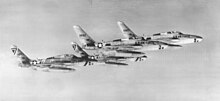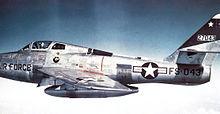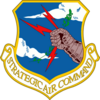| This article needs additional citations for verification. Please help improve this article by adding citations to reliable sources. Unsourced material may be challenged and removed. Find sources: "407th Air Expeditionary Group" – news · newspapers · books · scholar · JSTOR (January 2013) (Learn how and when to remove this message) |
| 407th Air Expeditionary Group | |
|---|---|
 407th Air Expeditionary Group emblem 407th Air Expeditionary Group emblem | |
| Active | 1943–1944 1953–1957 17 April 2003 – December 2011 2016–June 2022 |
| Country | United States |
| Branch | United States Air Force |
| Type | Air Expeditionary Group |
| Part of | United States Air Forces Central Command 332d Air Expeditionary Wing |
| Garrison/HQ | Ahmad al-Jaber Air Base |
| Commanders | |
| Notable commanders | Carroll W. McColpin |

The 407th Air Expeditionary Group (407 AEG) was a provisional United States Air Force unit assigned to the United States Air Forces Central Command, 332d Air Expeditionary Wing. It was stationed at Ali Air Base, Iraq, until the closure of the base on 16 December 2011. It was activated as part of the 332d Air Expeditionary Wing due to Military intervention against ISIL at Ali Al Salem Air Base, Kuwait, and Ahmad al-Jaber Air Base, Kuwait. In 2023 Jane's Defence Weekly confirmed a June 2022 AFCENT statement that the 407 AEG had been inactivated.
The 407 AEG provided air operations support for coalition air dominance, battlespace control, and security to advance the stabilization of southern Iraq. It provides coalition tactical airlift support with aerial port operations. The 407 AEG was the first Air Force unit to stand up combat operations within Iraq during Operation Iraqi Freedom.
The group traces its history back to the World War II 407th Bombardment Group (Dive) which was established 23 March 1943, at Drew Field, Florida. The air echelon was attached to Eleventh Air Force in Amchitka, Alaska, from 19 July to 15 August 1943, where it performed combat operations against the Japanese in the Aleutian Islands.
Overview
In the early 2020s it consisted of the following squadrons:
- Unknown Expeditionary Fighter Squadron
- 407th Expeditionary Aircraft Maintenance Squadron
- 407th Expeditionary Civil Engineer Squadron
- 407th Expeditionary Communications Squadron
- 407th Expeditionary Logistics Readiness Squadron
- 407th Expeditionary Operations Support Squadron
- 407th Expeditionary Security Forces Squadron
- 407th Expeditionary Force Support Squadron
Former units
History
World War II
The 407th AEG traced its history back to the 407th Bombardment Group (Dive) which was established 23 March 1943, at Drew Field, Florida. Its subordinate squadrons at that time included the 632d, 633d, 634th and 635th Bombardment (Dive) Squadrons. The air echelon was attached to Eleventh Air Force in Amchitka, Alaska, from 19 July to 15 August 1943, where it performed combat operations against the Japanese in the Aleutian Islands.
The 407th was redesignated the 407th Fighter-Bomber Group on 15 August 1943. At that time, the 632d, 633d and 634th were redesignated the 515th, 516th and 517th Fighter-Bomber Squadrons, respectively, and the 635th was disbanded. In 1943, the 407th flew the Douglas A-24 Banshee dive bombers; North American A-36 Invader dive bombers, P-51D Mustangs, and the P-47 Thunderbolt from 1943 to 1944 as part of the Army Air Forces School of Applied Tactics. In October 1943 the group moved the Lakeland Army Airfield, Florida, and then to Galveston Army Airfield, Texas in November where it trained for combat, and functioned as a replacement unit until 1 April 1944, when it was disestablished.
Strategic Air Command




The 407th was reactivated as the Strategic Air Command 407th Strategic Fighter Wing at Great Falls AFB, Montana in 1953. While it was established on 23 March 1953 it was not activated until 18 December 1953. The wing was assigned to the Fifteenth Air Force and composed of the 407th Air Refueling Squadron with KB-29 Superfortress tankers and the 515th, 516th and 517th Strategic Fighter Squadrons, equipped with the Republic F-84G Thunderjet. Also assigned to the wing in "attached" status was the 91st Strategic Reconnaissance Squadron (20 December 1954 – 17 July 1955) with RF-84Ks. In 1955 KC-97s replaced the KB-29s.
Delays in delivery of the F-84Gs to the wing led to operational training not commencing until June 1954. Once operational, from August to November 1954, the 407th deployed to Misawa Air Base, Japan, where it provided air defense of northern Japan. In doing so, from 8 August to 10 November 1954 it was attached to the 39th Air Division (Defense). Returning to the United States, the wing sent its straight-winged F-84Gs to AMARC, and was re-equipped with newer and faster swept-wing F-84F Thunderstreaks. From Great Falls, the 407th provided long-range fighter escort and refueling for B-36 Peacemaker and B-50 Superfortress bombers.
The wing had a short life, as the strategic fighter doctrine was phased out of use beginning in 1956. The 407th SFW was inactivated on 1 July 1957.
Twenty-first century
The 407th was redesignated the 407th Air Expeditionary Group and later activated at Tallil Air Base (known as Ali Base), Iraq, on 14 April 2003 as a subordinate to the 332d Air Expeditionary Wing, which was stationed at Al Jaber AB, Kuwait.
Throughout the summer of 2003, the mission at Ali Base (Tallil AB) expanded. The flightline became home to A-10s, C-130s and Predators. The 332d AEW then transferred from Al Jaber AB, Kuwait, to Ali Base on 5 August 2003. During that period, the wing's A-10s destroyed more than 1,100 targets during major combat operations of Operation Iraqi Freedom. It was also here that U.S. Special Forces staged and planned the rescue of Army Private 1st Class Jessica Lynch, and where the private was flown out of Iraq.
In addition to its operational commitments, the 407 AEG was the Senior Airfield Authority at Ali Air Base, and was responsible for the defense, control, operations and maintenance of the airfield, land and facilities whose proximity affected airfield operations
Ali Air Base was fully vacated by all U.S. Forces on 16 December 2011, and the 407th AEG was inactivated.
It was activated again in 2016, as part of the 332d Air Expeditionary Wing, as part of the Military intervention against ISIL stationed at Ali Al Salem Air Base, Kuwait, and Ahmad al-Jaber Air Base, Kuwait.
Lineage
- 407th Fighter-Bomber Group
- Constituted as the 407th Bombardment Group (Dive) on 23 March 1943
- Activated on 28 March 1943
- Redesignated 407th Fighter-Bomber Group in August 1943
- Disbanded on 1 April 1944
- Reconstituted and consolidated with the 407th Strategic Fighter Wing as the 407th Strategic Fighter Wing on 31 January 1984
- 407th Air Expeditionary Group
- Constituted as the 407th Strategic Fighter Wing on 25 March 1943
- Activated on 18 December 1953
- Inactivated on 1 July 1957
- Consolidated with the 407th Fighter-Bomber Group on 31 January 1984
- Converted to provisional status and redesignated 407th Air Expeditionary Group
- Activated on 17 April 2003
- Inactivated on 16 December 2011
- Activated during 2016
Assignments
- 22d Bombardment Training Wing, 28 March 1943
- III Fighter Command, 15 August 1943
- 72d Fighter Wing, 9 March 1943
- Second Air Force, 21 March – 1 April 1944
- Fifteenth Air Force, 18 December 1953 – 1 July 1957
- Attached to the 39th Air Division (Defense), 8 August – 10 November 1954
- Allocated to Air Combat Command to activate or inactivate any time after 14 April 2003
- Attached to United States Air Forces Central Command, 14 April 2003–present
- Further attached to the 332d Air Expeditionary Wing, 14 April 2003 – 24 April 2010
- Transferred under the 321st Air Expeditionary Advisory Wing, 24 April 2010 – 16 December 2011
- Further attached to 332d Air Expeditionary Wing
Components
- 91st Strategic Reconnaissance Squadron: Attached December 1954 – July 1955
- 407th Air Refueling Squadron: 18 December 1953 – 1 July 1957
- 495th Bombardment Squadron: (Attached) 1944
- 632d Bombardment (later 515th Strategic Fighter) Squadron: 1943–1944; 18 December 1953 – 1 July 1957
- 633d Bombardment (later 516th Strategic Fighter) Squadron: 1943–1944; 18 December 1953 – 1 July 1957
- 634th Bombardment (later 517th Strategic Fighter) Squadron: 1943–1944; 18 December 1953 – 1 July 1957
- 635th Bombardment Squadron: 1 Mar-15 Aug 1943
Stations
- Drew Field, Florida, 28 March 1943
- Operated from Amchitka Army Airfield, Alaska Territory, Jul–Aug 1943
- Lakeland Army Airfield, Florida, 2 October 1943
- Galveston Army Airfield, Texas, 9 Nov 1943 – 1 Apr 1944
- Great Falls AFB, Montana, 18 December 1953 – 1 July 1957
- Operated from Misawa AB, Japan, 8 August-10 November 1954
- Ali Air Base, Iraq, 14 April 2003 – 16 December 2011
- Ahmad al-Jaber Air Base, Kuwait, 2016–present
Aircraft
|
|
References
![]() This article incorporates public domain material from the Air Force Historical Research Agency
This article incorporates public domain material from the Air Force Historical Research Agency
- "Airman makes most of deployment". DVIDS. 9 December 2016.
- Reconnaissance squadron's Predators keep vigilant eye on Iraq, 407th Air Expeditionary Group Public Affairs
- "Air Force identifies airman killed by storm in Jordan". Air Force Times. 9 December 2016.; "USARCENT command team travels region to focus on enduring partnership". US Army. 9 December 2016. Archived from the original on 20 December 2016. Retrieved 9 December 2016.
- Maurer, pp. 293–294
- ^ Department of the Air Force/MPM Letter 539q, 31 January 1984, Subject: Consolidation of Units
- Ravenstein, pp. 220–221
- Maurer, Maurer (1983). Air Force Combat Units of World War II. Maxwell AFB, Alabama: Office of Air Force History. ISBN 0-89201-092-4.
- 407th Air Expeditionary Group Factsheet
External links
| Airfields |  | ||||||||||||||
|---|---|---|---|---|---|---|---|---|---|---|---|---|---|---|---|
| Units |
| ||||||||||||||
| |||||||||||||||
| Units |
|  | ||||||||||||||||||
|---|---|---|---|---|---|---|---|---|---|---|---|---|---|---|---|---|---|---|---|---|
| ||||||||||||||||||||
